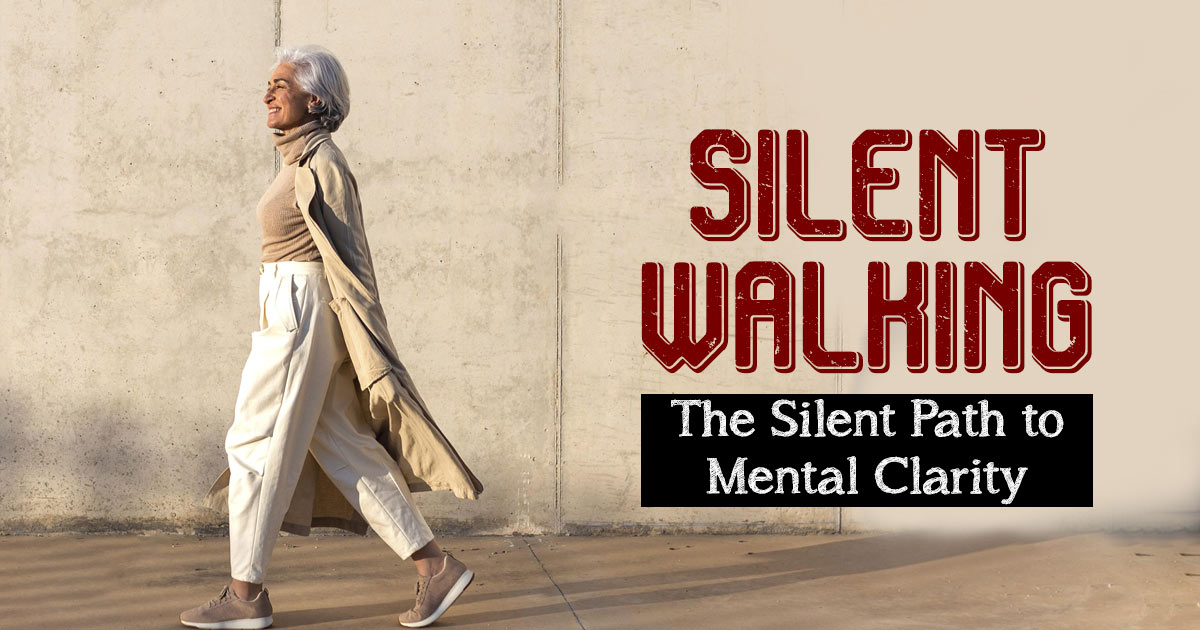- Recent research recognizes the rich tradition and science behind silent walking.
- It also highlights the mental health benefits of silent walking, including stress reduction and enhancing mindfulness.
In today’s fast-paced world, where the relentless noise of technology and the demands of daily life often drown out the stillness of our inner selves, the practice of silent walking emerges as a potent antidote.
Silent walking, also known as walking meditation, is a contemplative practice that transcends the physical act of walking. It offers a profound connection between mind and body, leading to a host of mental health benefits.
The Roots Of Silent Walking
Silent walking is not a novel concept; it has deep historical roots in various spiritual and philosophical traditions around the world. Perhaps the most well-known practice of walking meditation can be traced back to Buddhism, particularly Zen Buddhism.
In the Zen tradition, kinhin, or walking meditation, is an integral part of the meditation practice. Practitioners walk slowly and mindfully, often in a circular path, to cultivate mindfulness and concentration.
Other cultures and belief systems also have their own forms of contemplative walking. For instance, Native American tribes practiced silent walking as a way to connect with nature and their inner selves.
Even in the West, philosophers like Friedrich Nietzsche and Henry David Thoreau extolled the virtues of walking as a means to clear the mind and nurture the soul. The common thread among these diverse traditions is the recognition of walking as a powerful tool for self-reflection and inner peace.
The Science Of Silent Walking And Mental Health
While the historical and cultural significance of silent walking is undeniable, modern science has started to shed light on its mental health benefits. Research in the fields of psychology, neuroscience, and mindfulness meditation has provided compelling evidence of how silent walking positively impacts mental well-being.
Stress Reduction:
One of the foremost mental health benefits of silent walking is its ability to reduce stress. In a world characterized by constant stimulation and information overload, the practice of silent walking provides a much-needed break from the chaos.
Studies have shown that slow, deliberate walking and focusing on the present moment during silent walking can lower cortisol levels, the body’s stress hormone. This reduction in stress hormones can lead to a greater sense of calm and relaxation.
Mindfulness And Presence:
Silent walking encourages mindfulness, which is the practice of paying attention to the present moment without judgment. Mindfulness has been extensively researched and shown to have numerous mental health benefits, including reduced symptoms of anxiety and depression.
Silent walking, with its deliberate and focused pace, encourages practitioners to become acutely aware of each step, their breathing, and the sensations in their body. This heightened state of mindfulness can help individuals detach from negative thought patterns and be more present in their lives.
Improved Mood:
Regular practice of silent walking has been linked to improvements in mood. When we engage in this contemplative activity, the release of endorphins, our brain’s feel-good chemicals, is triggered.
Additionally, the sense of accomplishment that comes from completing a silent walk can boost self-esteem and provide a sense of purpose. This is particularly valuable for those struggling with mood disorders such as depression.
Emotional Regulation:
Silent walking can also aid in emotional regulation. By creating a space for reflection and self-awareness, it allows individuals to process and understand their emotions better. This can be particularly helpful for those dealing with anxiety, anger, or grief, as it provides a healthy outlet for these emotions and promotes emotional resilience.
Enhanced Creativity:
Walking has long been associated with enhanced creativity. Silent walking, with its meditative qualities, can unlock the creative potential of the mind. It allows for the free flow of thoughts and ideas, unburdened by the pressures of daily life. Many great thinkers and artists throughout history have utilized walking as a means of stimulating their creative processes.
Physical Health Benefits:
The mental health benefits of silent walking are closely intertwined with its physical advantages. Regular walking is known to improve cardiovascular health, strengthen muscles, and enhance overall physical well-being. These physical improvements can have a direct positive impact on mental health, as a healthy body often leads to a healthier mind.
Practical Tips For Practicing Silent Walking
To fully reap the mental health benefits of silent walking, it is important to practice it mindfully and regularly. Here are some practical tips to get started:
- Find a Quiet Space: Choose a location where you can walk in peace without distractions or interruptions. It could be a park, a garden, or even a quiet room in your home.
- Start Slowly: Begin with short walks and gradually increase the duration as you become more comfortable with the practice.
- Focus on Your Breath: Pay attention to your breathing as you walk. This helps anchor you in the present moment.
- Mindful Steps: Take each step mindfully, paying attention to the sensation of your foot lifting, moving through the air, and making contact with the ground.
- Let Go of Distractions: If your mind starts to wander, gently bring your focus back to your walking and your breath.
- Practice Regularly: Consistency is key. Try to incorporate silent walking into your daily or weekly routine.
In a world marked by constant noise and distractions, silent walking emerges as a powerful practice to nurture our mental health. With its roots in ancient traditions and support from modern scientific research, it offers a range of benefits, including stress reduction, enhanced mindfulness, improved mood, emotional regulation, and even increased creativity.
By taking the time to engage in silent walking, we can reconnect with ourselves, find moments of tranquility, and ultimately foster a greater sense of well-being in our lives. As we step mindfully, we step towards better mental health.










